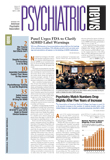Two new datasets are reinforcing some health care providers' fears that recent large increases in prescriptions for medications used to treat attention-deficit/hyperactivity disorder (ADHD) could lead to a significant increase in the number of reports of serious adverse events associated with the drugs, especially for adults.
The Food and Drug Administration's Drug Safety and Risk Management Advisory Committee in February endorsed labeling all stimulant medications with new black-box warnings regarding the potential for serious cardiovascular adverse events, including sudden death. (see story beginning on
page 1). That committee noted reports released last year showing that prescribing of stimulants for ADHD in children was beginning to level off after years of significant annual growth. However, between 2000 and 2004, prescribing of ADHD medications to adults increased dramatically. The advisory committee expressed concern over the danger presented by using medications that may have cardiovascular adverse events in an adult population, in whom heart disease is very common.
Last month, Medco Health Solutions, the nation's largest pharmacy benefit manager, released updated data that confirm the worrisome trends. The number of younger adults (aged 20 to 44) using ADHD medications, Medco said, increased nearly 140 percent between 2000 and 2005, outpacing increases in children aged 19 and under by over 80 percent.
The Medco analysis, covering prescription data for 2.5 million patients, found that the number of children under age 10 taking the medications increased by 65 percent from 2000 to 2005. However, the numbers decreased by 5 percent from 2004 to 2005.
A second analysis, by the Agency for Healthcare Research and Quality's (AHRQ) Samuel Zuvekas Ph.D., reported data from a nationally representative annual survey conducted by the agency. Zuvekas and his colleagues reported in the April American Journal of Psychiatry that “[t]he steep increase in the utilization of stimulants among children 18 years and younger that occurred over the 1987-1996 period attenuated in the following years, through 2002, and has remained stable among very young children.”
The AHRQ report determined that 2.7 percent of children under age 19 took prescription stimulant medications in 1997, compared with 2.9 percent in 2002 (a nonstatistically significant increase). Use was highest in 2002 among children aged 6 to 12 (4.8 percent), compared with 3.2 percent for those aged 13 to 19, and 0.3 percent for those under age 6. The percentages equate to 2.2 million children receiving prescriptions for stimulant medication in 2002 compared with 2.0 million in 1997.
Am J Psychiatry 2005 163 579
